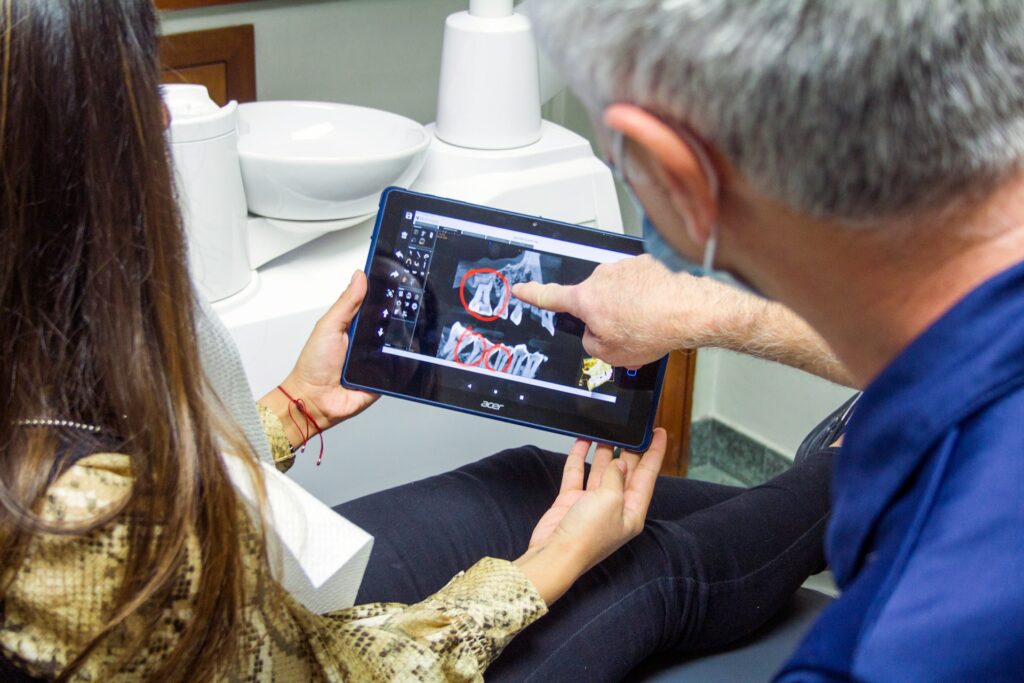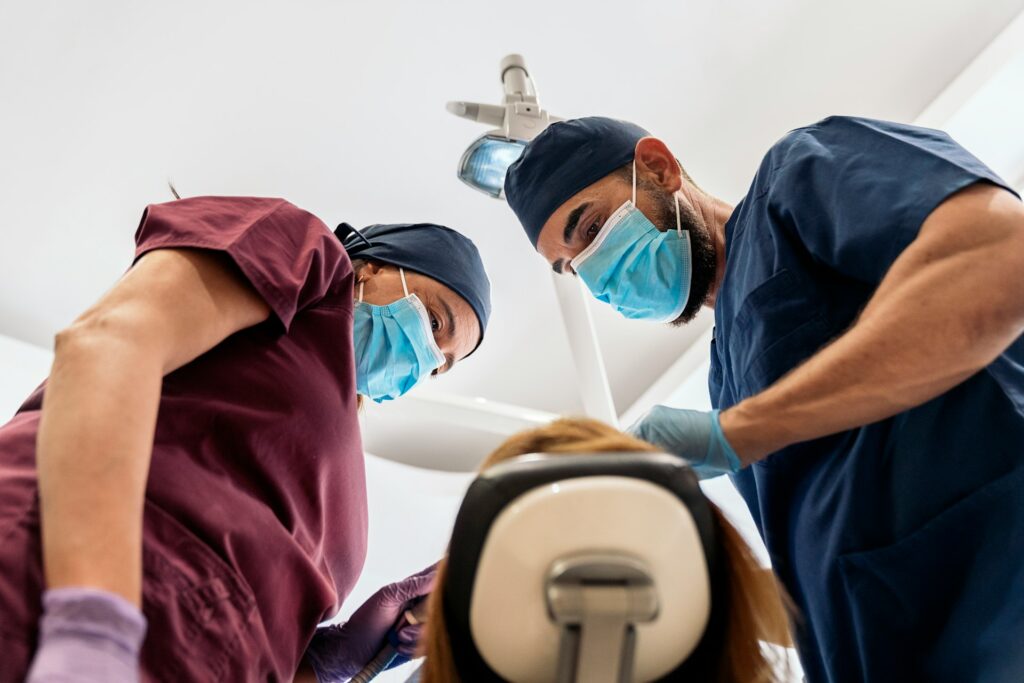The weekend is traditionally a time for r’n’r, to let your hair down or kick your feet up, and leave the worries of the week behind. It’s certainly not the time of the week that we expect to be spending at the dentists. Yes, it’s true, dental problems over the weekend can leave us in a spin and an unplanned panic, as contingency plans for such an episode are rarely in place. We never plan to knock out a tooth, break our braces, or correctly anticipate the pain of a toothache in advance.
When it happens, wrong decisions can exacerbate an already fraught (or should we say ‘fractured’?) situation. So, we’re here to chew the fat on what constitutes a dental emergency and who to contact for help. Here are 7 simple steps to take if a weekend dental emergency strikes.
Step 1: Recognise The Emergency
When that niggling tooth pain transforms into something more sinister, it’s crucial to know whether you’re dealing with a genuine dental emergency or something that can wait until Monday morning. The most obvious sign is severe, unrelenting tooth pain that keeps you tossing and turning all night. If you notice your face beginning to swell, particularly if it affects your breathing or vision, that’s your cue to seek immediate help. The same goes for any trauma that’s left your teeth loose or, heaven forbid, knocked clean out.
Persistent bleeding that won’t stop with pressure isn’t something to sleep on, and neither are those telltale signs of infection: fever, swelling, and severe pain that makes you want to climb the walls. A broken jaw or severe facial trauma? Well, that’s definitely not something to sleep on, either.

Step 2: Keep Your Emergency Contacts Handy
Being caught short without the right number to call can turn a dental drama into a full-blown crisis. Before disaster strikes (and it always seems to strike at the most inconvenient times), make sure you’ve got your emergency contacts sorted. Your regular dentist’s emergency number should be right at the top of that list – many practices nowadays have special arrangements for weekend emergencies.
Pop NHS 111 in there too; they’re absolute champions at providing out-of-hours dental advice. Know where your nearest emergency dental clinic is, and keep their number handy. For those particularly nasty accidents involving facial trauma, your local A&E department’s details are essential. Here’s a nifty bit of intel: many dental practices now offer WhatsApp consultation services, perfect for sending those “is this as bad as I think it is?” photos. Worth asking your dentist about this service before you need it.
Step 3: Provide Immediate First Aid
Different dental disasters call for different types of urgent dental care and their accordant emergency responses, and knowing what to do in those crucial first moments can make all the difference. Take a knocked-out tooth, for instance – it’s not game over if you act fast. First things first: find that tooth! Handle it like fine china, touching only the crown (that’s the part you usually see, not the root). Give it a gentle rinse with milk or saline, but for heaven’s sake, don’t scrub it – you’ll do more harm than good.
If you’re feeling brave, try popping it back in its socket. If that’s not your cup of tea, pop it in a container of milk or saline solution instead. Just remember: time is of the essence. You’ve got about 60 minutes to get to a dentist if you want the best chance of saving that tooth.
Step 4: Manage Pain & Swelling
While you’re waiting for professional help (and doesn’t that wait always feel like an eternity?), there’s plenty you can do to keep yourself comfortable. A dynamic duo of paracetamol and ibuprofen can work wonders for pain relief – just follow the dosage instructions, mind you.
Get friendly with a cold compress; 15 minutes on, 15 minutes off on the outside of your face can help keep swelling at bay. Warm salt water rinses are your new best friend – give them a go every hour. If you can get your hands on some clove oil from the chemist, that’s nature’s little numbing agent right there. And while you might be tempted by that steaming cup of tea or ice-cold drink, your tender tooth will thank you for sticking to room temperature refreshments for now.
Step 5: Handle Common Weekend Mishaps
Weekends have a funny way of throwing dental curveballs our way. Take broken braces, for instance – a situation that always seems to crop up right before a big event. Orthodontic wax becomes your best mate here; it’s brilliant for covering those sharp edges that are trying to redesign the inside of your cheek. If you’ve got a wire playing havoc, the clean end of a pencil can be your unlikely hero – use the eraser end to gently push it back into place. Just resist the urge to play dentist with those wire cutters!
Lost a filling while tucking into your Friday night takeaway? First off, give the cavity a gentle clean with warm water. Your local chemist will be able to sort you out with some temporary filling material – it’s not pretty, but it’ll do the job until you can get to the dentist. In the meantime, treat that side of your mouth like it’s on holiday – no heavy lifting required.

Step 6: Know When To Head To A&E
Sometimes what starts as a dental emergency can take a turn that warrants a trip to Accident & Emergency. If you find yourself struggling to breathe because of swelling, or you’ve taken a knock that might have rearranged your jaw, A&E is your best bet. The same goes for bleeding that’s deciding to be stubborn about stopping, or if you’re showing signs of a serious infection – think fever, breathing difficulties, or swelling that’s making you look like you’ve gone a few rounds in the ring.
Step 7: Prevention Is Better Than Cure
While we can’t bubble-wrap our teeth for the weekend, we can certainly stack the odds in our favour. Sporting types, make friends with your mouthguard – it’s a lot cheaper than dental work. Save your teeth for eating and smiling; they’re not bottle openers or scissors, no matter how tempting that may be when you’re in a pinch. Regular check-ups with your dentist might seem like a faff, but they’re champions at spotting little problems before they turn into weekend-ruining emergencies. And while dental insurance might seem like just another monthly expense, you’ll be glad you have it when you’re facing an emergency bill that makes your eyes water more than the toothache.
Remember, dental emergencies don’t keep office hours, but thankfully, neither do emergency dentists. Don’t let fear or inconvenience stop you from seeking help – your teeth (and your weekend) will thank you for taking swift action. Keep this guide handy, and hopefully, you’ll never need to use it. But if you do, you’ll be glad you were prepared!
*This article is meant as general advice only and should not replace professional medical guidance. Always consult qualified dental professionals for specific medical advice about your situation. In case of doubt, contact NHS 111 or visit your nearest A&E department.*





